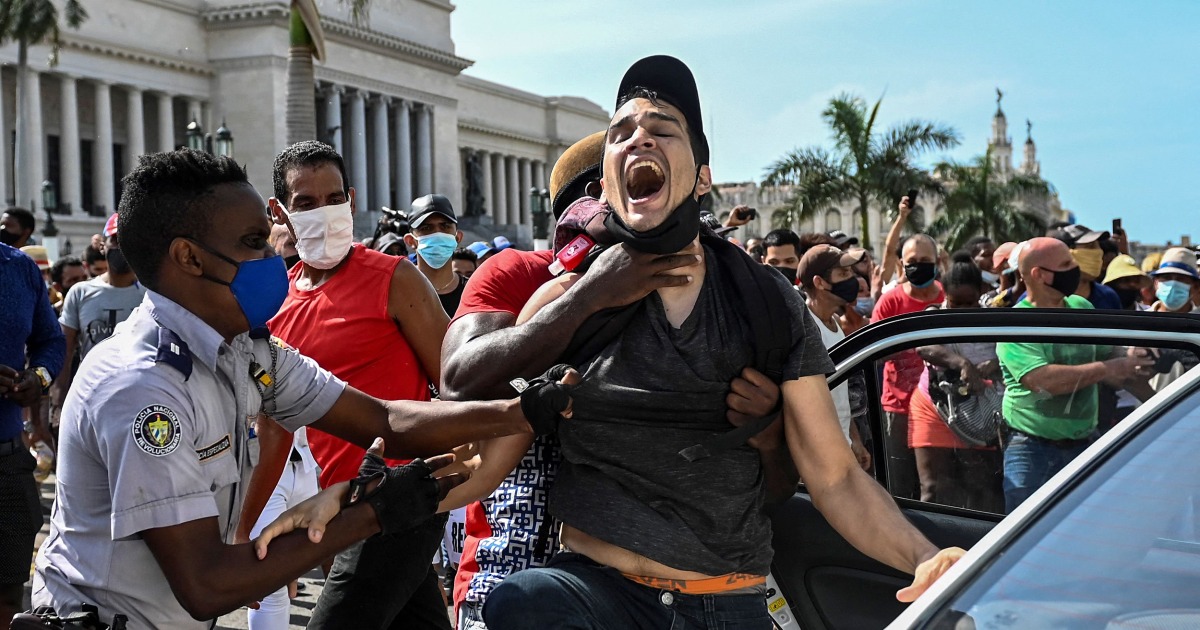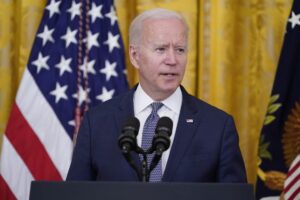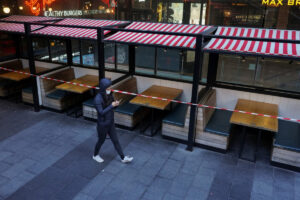A defiant Cuban president lashed out at the U.S. embargo against Cuba on Monday in response to rare protests across the country over the lack of food, fuel, medicine and other goods during the pandemic.
President Miguel Díaz-Canel said that a “politics of economic asphyxiation” was having a “cumulative effect” throughout Cuba.
He and representatives from his government said U.S. sanctions against Cuba had contributed to power outages and limited access to food and medical supplies during the pandemic.
Speaking of the economic issues in Cuban society and the reasons some have been protesting, Díaz-Canel said, “What is their origin, what is their cause? It is the blockade.”
The president said the Cuban protests were the result of a U.S. and social media campaign to manipulate people while the island is facing hardship during the pandemic.
Addressing the people, he said, it was legitimate “to have dissatisfactions, but also we have to be capable to visualize, to define when we’re being manipulated, where they want to separate us.”
He said forces that want to appear as “saviors” to Cuba “are not interested in the health of the people.”
“They want to change a system, or a regime they call it, to impose what type of government and what type of regime in Cuba? The privatization of public services. The kind that gives more possibility to the rich minority and not the majority.”
Cuba’s health minister said that the embargo has impacted Cuba’s ability to combat the virus through restrictions on medications and supplies to make medicines, as well as equipment such as ventilators.
Díaz-Canel also denounced what he called the “Cuban mafia” in Miami, referring to Cuban American community members and legislators opposed to the Communist government.
Thousands of Cubans took to the streets across the country on Sunday, shouting slogans against the government such as, “We want freedom” and “We are no longer afraid.”
Cuba is currently facing its worst economic crisis in decades, following the collapse of the Soviet Union, worsened by the ongoing coronavirus pandemic. The pandemic drove tourism, which was a critical driver of the island economy, to a halt. The country has since seen food shortages, power outages and mounting coronavirus cases.
It has also seen an increase in repression against political opponents and a strained health system during a critical stage of the pandemic. Health authorities reported almost 7,000 new cases and 47 deaths — a record for infections and deaths on the Caribbean island of just over 11 million people.
In Miami, hundreds of people gathered in the Little Havana neighborhood in solidarity with the growing protests in Cuba. “I know my family in Cuba is struggling, people are dying. It’s terrible,” Miami resident Christian Guzmán told NBC station WTVJ.
“Right now, it’s hard. There’s no food, there’s no medicine. The Covid outbreak. The whole country is in the streets,” Miami resident Darío Suárez said.
Díaz-Canel appeared on national television earlier to call on the army to confront the protesters: “The order to fight has been given,” he said.
Díaz-Canel also called “all the revolutionaries in the country, all the communists, to take to the streets and go to the places where these provocations are going to take place.”
U.S. President Joe Biden on Monday voiced support for the Cuban protesters, a day after the historic anti-government demonstrations.
“We stand with the Cuban people and their clarion call for freedom and relief from the tragic grip of the pandemic and from the decades of repression and economic suffering to which they have been subjected by Cuba’s authoritarian regime,” Biden said in a statement.
“The United States calls on the Cuban regime to hear their people and serve their needs at this vital moment rather than enriching themselves,” he added.
Also on Monday, Mexican President Andres Manuel Lopez Obrador called for the U.S. embargo of Cuba to end.
“The truth is that if one wanted to help Cuba, the first thing that should be done is to suspend the blockade of Cuba as the majority of countries in the world are asking,” Lopez Obrador told a news conference, according to Reuters.



















